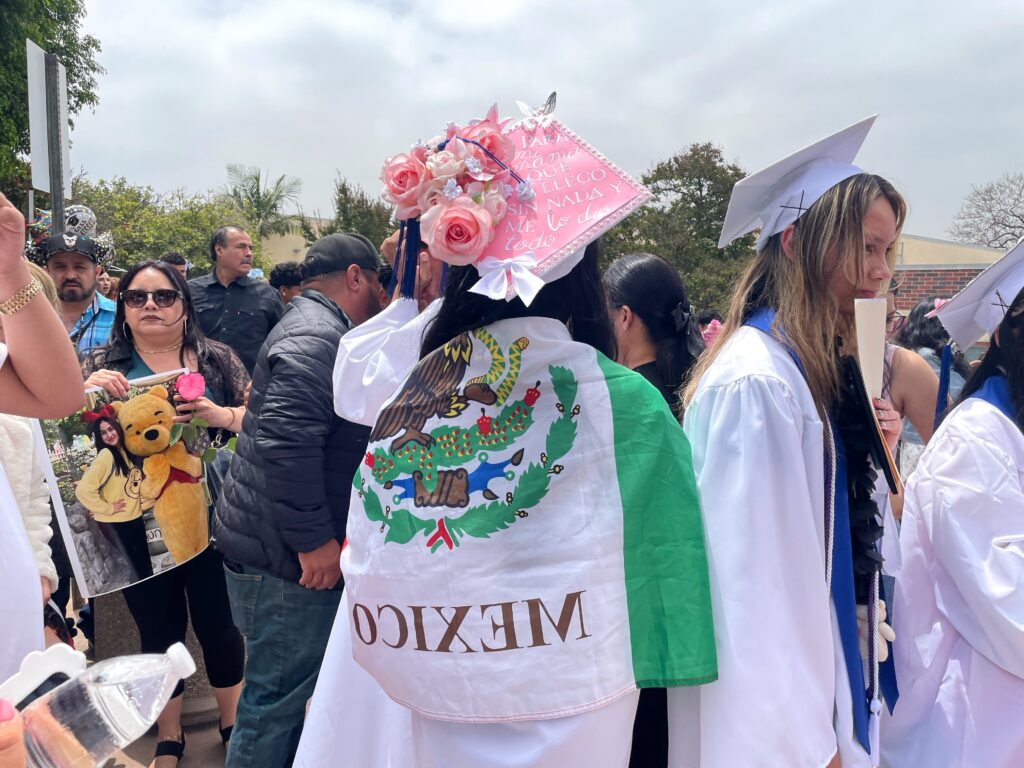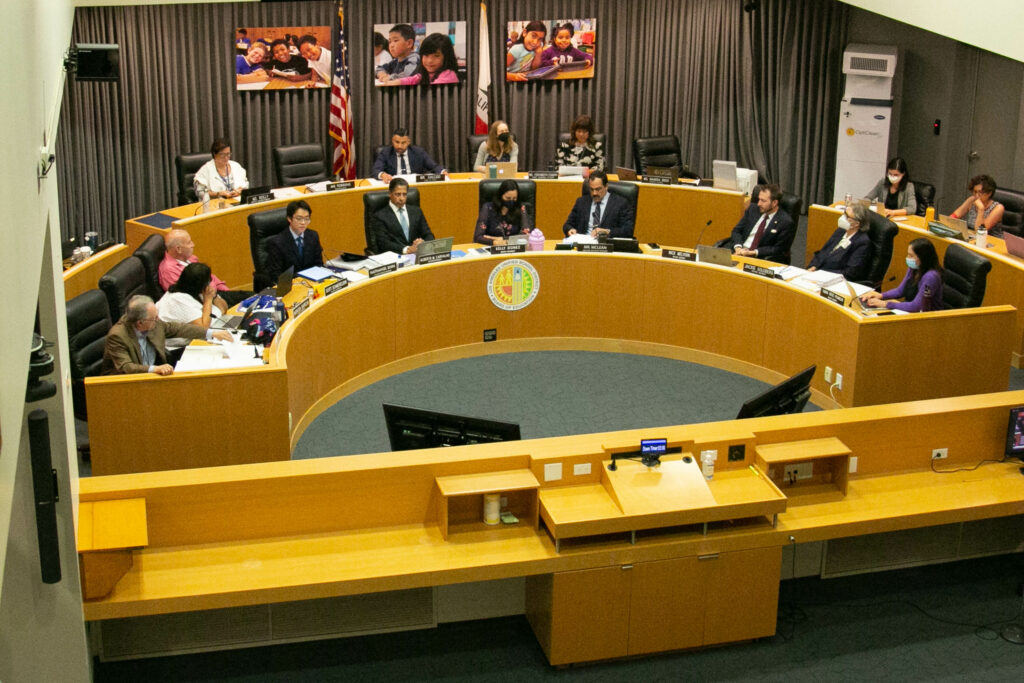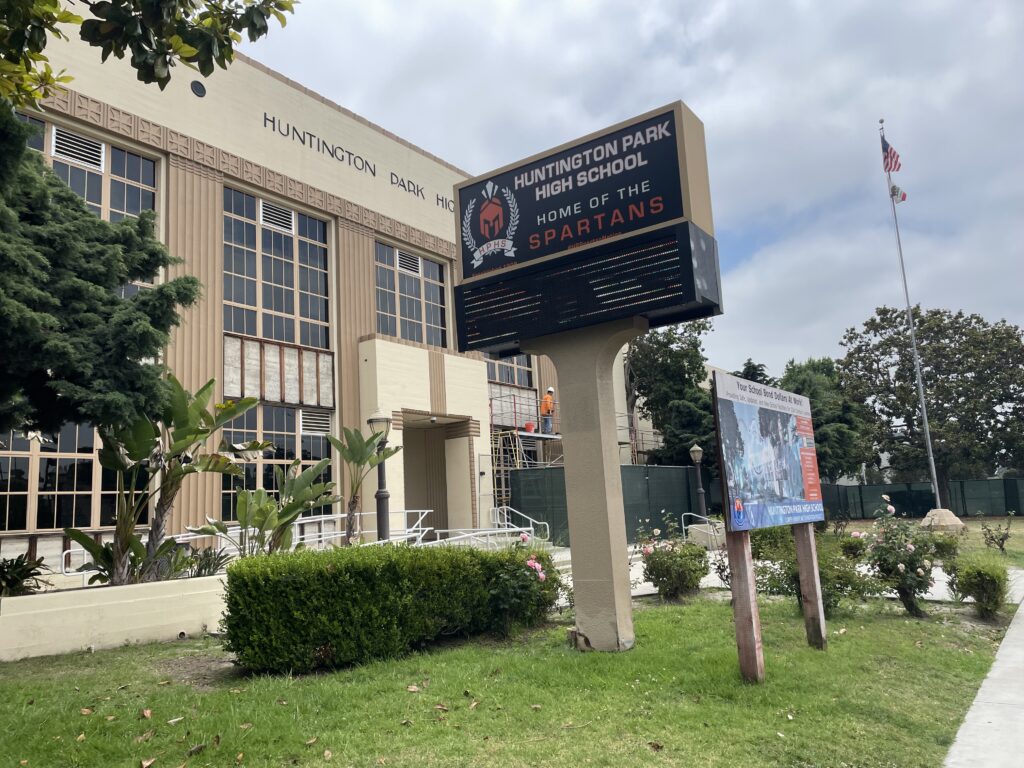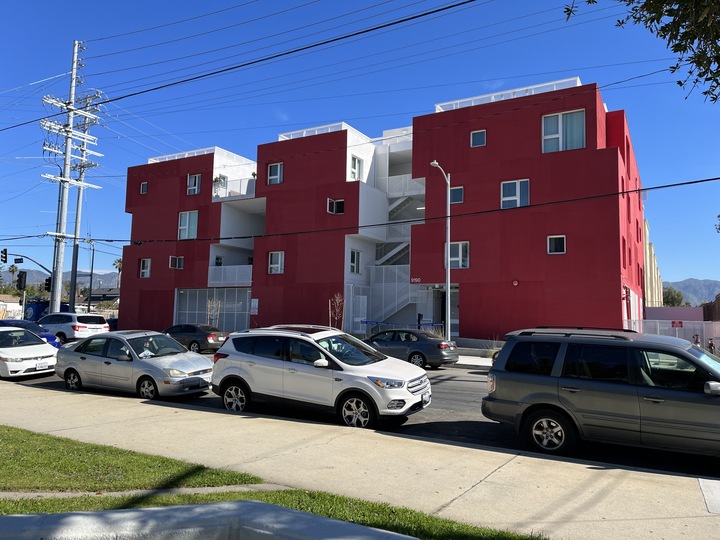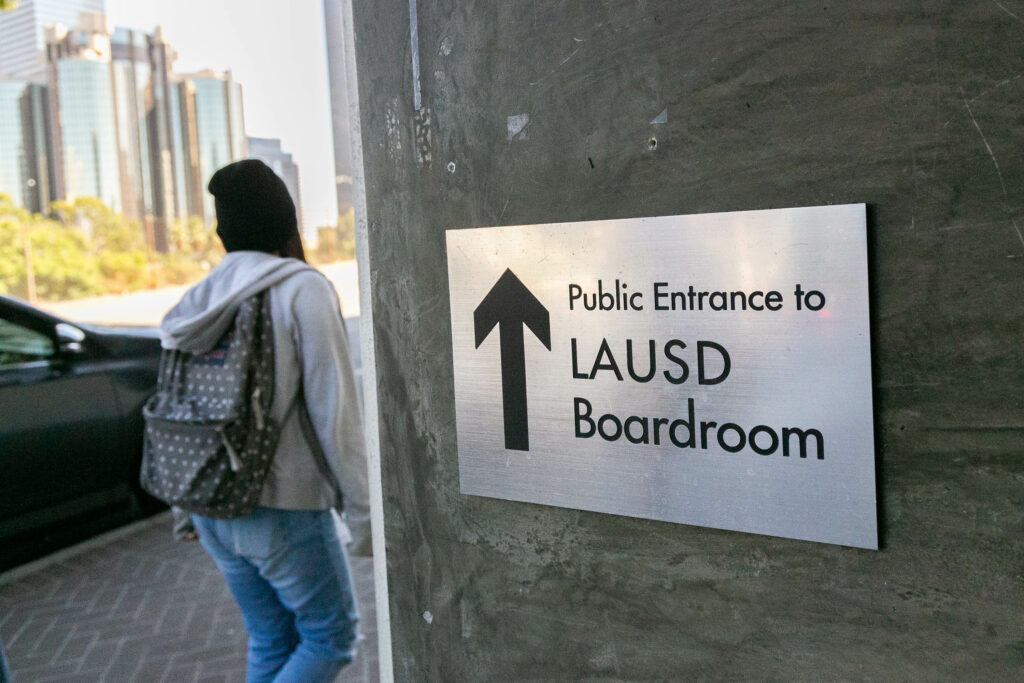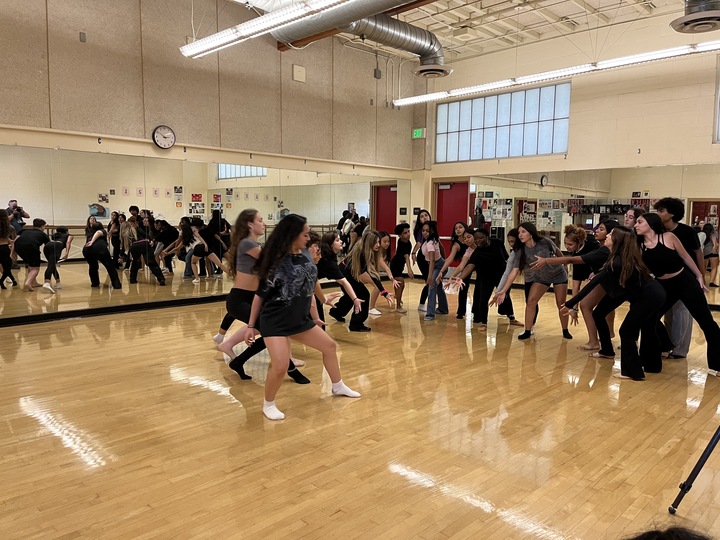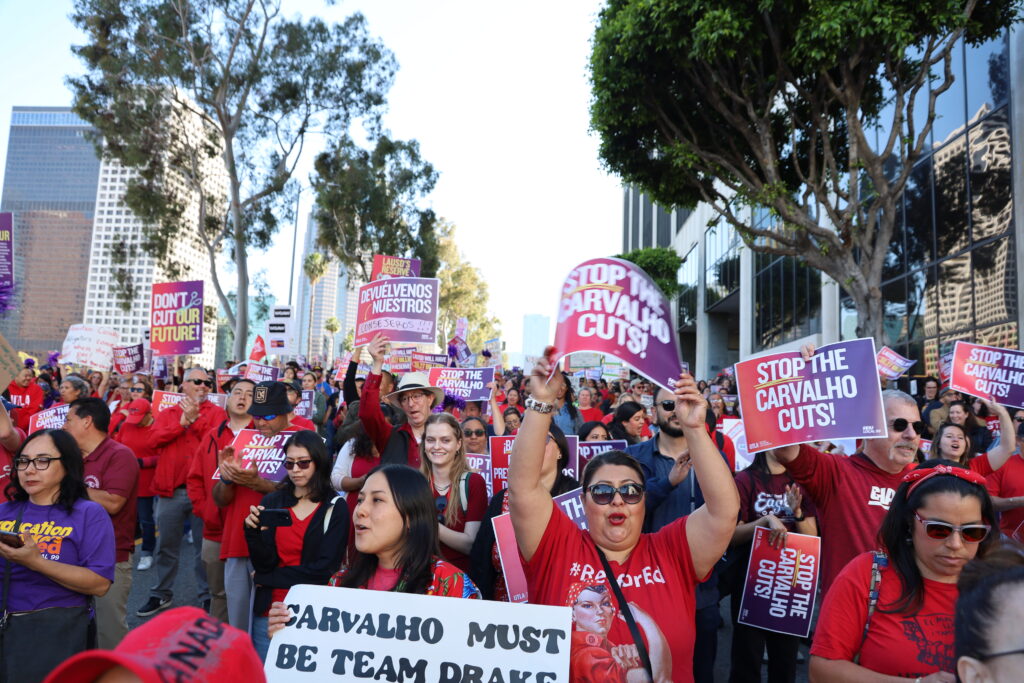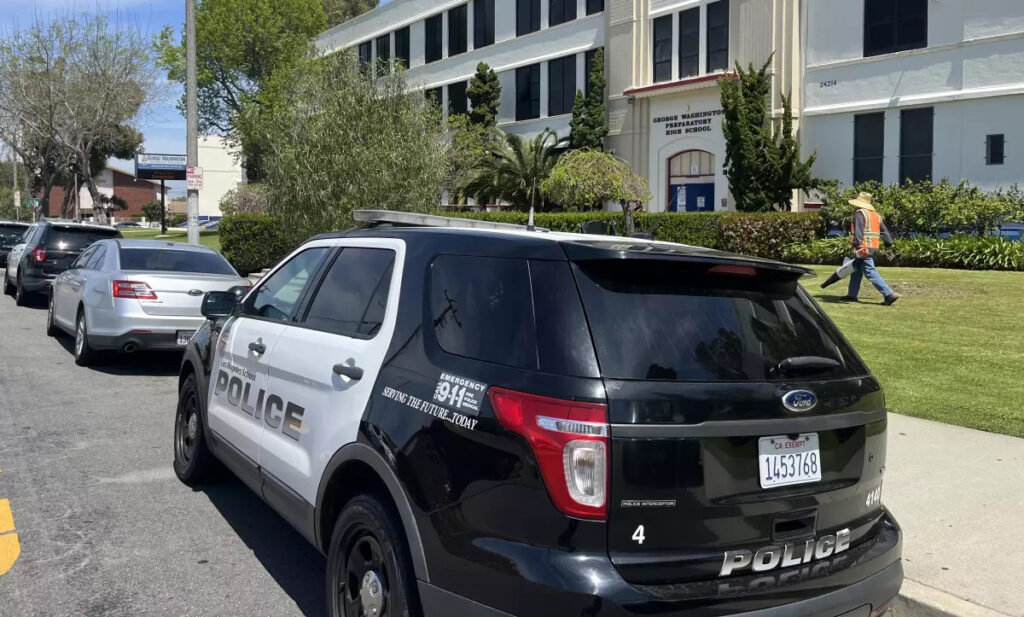
Jackie, a Maywood Academy High School graduate, wrapped the Mexican flag around her gown as she looked for her mother in the crowd after the ceremony.
Photo: Betty Márquez Rosales
Top Takeaways
- Students and families experienced a mix of joy and anxiety before and during ceremonies.
- Commencements remained safe amid regional ICE presence.
- LAUSD deployed school police and communities established volunteer efforts to ensure safety.
Maywood Academy High School’s graduation Thursday was classic in a county where nearly half its population identifies as Latino.
Students decorated their caps with photos of loved ones and messages of gratitude to God and their immigrant families. A student’s rendition of “The Star-Spangled Banner” was met with cheers from the crowd; some graduates carried lavish bouquets of roses, commonly known as ramos buchones; their guest speaker was a prominent record label owner pivotal in the rise of corridos tumbados, a now-mainstream genre of Mexican American music with a stronghold in Los Angeles; some students’ stoles featured flags from both the United States as well as Mexico, El Salvador and Guatemala — their families’ home countries.
Among them was Jackie, a graduating senior who plans to study cosmetology at Cypress College in the fall. She was wrapped in the Mexican flag, and in Spanish, her cap read: “For my mom, who arrived with nothing and gave me everything.”
“I’m first-generation — everything is for my mami,” said Jackie, who declined to share her last name out of fear of immigration raids by federal agents. “I’m proud of my culture.”
Anxiety about immigration enforcement actions was omnipresent. They have largely targeted predominantly working-class, Latino, and immigrant neighborhoods like Maywood, a densely populated city that is just over 1 square mile wide.
“I apologize to you for the words of many who insult and demean and diminish your parents, in some cases yourselves, and I have to admit to you, me. For I am you,” said Los Angeles Unified School District Superintendent Alberto Carvalho, who was once an undocumented immigrant, during the ceremony.
Children of color make up the great majority of the district’s students, with nearly 75% identifying as Latino or Hispanic. And with families hunkering inside their homes to avoid potential interactions with ICE, many parents and relatives of this year’s graduates took the risk to celebrate.
“I’m so proud of her because she’s always worked hard,” said Rocio, Jackie’s mother. “We’re here with fear because of everything that is happening. And, we’re happy — but tense.”
On June 9, Los Angeles Unified announced a series of protocols to keep graduations as safe and normal as possible.
District police forces were deployed and formed a “perimeter of safety” around each LAUSD site where a graduation took place. Families were welcome to stay at the graduations as long as possible to avoid contact with ICE, and principals were instructed to avoid lines so parents didn’t have to wait on the streets.
The measures proved effective. And graduation ceremonies across Los Angeles Unified’s 86 senior high schools were not interrupted by any sign of immigration authorities’ presence. The final graduation ceremony is scheduled for Monday evening.
“We made a promise that our graduations are an extension of the school experience, therefore they’re protected spaces,” Carvalho said.
At the heart of ICE raids in Los Angeles
Part of the Maywood Academy campus sits within the city limits of Huntington Park, where, on the early morning of graduation day, the Department of Homeland Security Secretary Kristi Noem was present at an ICE raid at the home of a pregnant U.S. citizen.
On Friday, the day after the graduation, immigration agents were seen accosting and detaining people in Maywood. In the days leading up to the ceremony, immigration agents chased day laborers at the local Home Depot in Huntington Park.
And then there was the unspoken awareness that one of their peers, a 17-year-old Maywood Academy sophomore, was one of the hundreds of Angelenos recently detained by immigration agents. On June 3, 18 months after fleeing violence in their home country of Guatemala, Johanna, alongside her mother, Elizabeth, and youngest sister, Jessica, were detained by ICE while attending a scheduled immigration court appearance for their legal asylum case. The family declined to share their last name out of security concerns.

Johanna’s father, Hector, suddenly stopped receiving messages from his wife and daughters soon after they arrived at the court, and then they vanished for two days. He and his third daughter, Dulce, searched for them on the U.S. Immigration and Customs Enforcement’s website. By the time their information appeared on the site, they had been transferred to a detention center in Texas, where they remain as an attorney handles their case.
“I want my daughters to grow up and realize all their goals in the United States,” said Hector. “They’re all so intelligent, hardworking, and really amazing people to serve this country.”
Before the ICE raids started, his daughters had felt safe in their home and neighborhood.
“They’re so happy here. It’s a beautiful neighborhood, and their school is nearby,” Hector said. “They’re really happy.”
He said Maywood Academy is in constant contact, offering support, though the school declined to comment on the case.
Austin Santos, a geography and world history teacher who has taught both of Hector’s daughters in high school, said Johanna is on the path to becoming valedictorian and is “all-around a great student.”
“We made sure to tell the other students to be careful and used Johanna’s story to bring awareness to the situation because it’s not only happening at our school,” said Santos. “Her classmates and everyone around her — once the story broke, and they found out who was detained, they all rallied around her.”
Beyond Maywood
The area surrounding Maywood Academy is a hotbed of ICE activity. And it isn’t alone.
“We saw an ICE vehicle going toward St. George Church; I have friends in the court, and they’re not coming out; I saw two immigration officers on the sidewalk; there’s a community school nearby where the raid happened,” said Jorge-Mario Cabrera, a spokesperson for the Coalition for Humane Immigrant Rights of Los Angeles (CHIRLA), reading Rapid Response notifications aloud during an interview with EdSource.
LAUSD was early to establish itself as a sanctuary district — and the school board unanimously affirmed its commitment to immigrant students in November. The resolution also vowed to “aggressively oppose” any efforts to make districts work with federal agencies on matters dealing with immigration enforcement.
Months later, administrators at Lillian Street Elementary and Russell Elementary, both in South Los Angeles, denied entry to two officials from the Department of Homeland Security.
“The district has acted superbly and bravely — and they have set up the atmosphere to … welcome everyone and ensure that every child, regardless of their immigration status or background, feels safe,” Cabrera said.
“They are an example for us to follow, and we will continue to collaborate with them on as many opportunities as possible.”
Roughly five and a half miles from Maywood, in Boyle Heights — the home of Roosevelt High School and Garfield High School — sightings of ICE agents and unmarked cars have become more common. A checkpoint was stationed just outside a freeway entrance.
At the same time, June 8 was supposed to be about celebrating.
But in a community like Boyle Heights, with its history of law enforcement violence, Roosevelt High social studies teacher Thalia Cataño said the district’s approach to commencement safety was “tone deaf.” Volunteers organized hours ahead of the graduation ceremony to have teachers, locals and members of CHIRLA’s Rapid Response team patrol the area.
At the same time, leading up to the ceremonies, students contemplated whether to have their families come and support them. Others wondered if they should attend their graduation.
Most did.
And when the now-alumni of Roosevelt High returned to school on June 9 to officially wrap up their high school careers, they reminisced on the ceremony — the highs and lows.
“We’re there. We’re happy,” Cataño heard her students sharing. “But we’re looking over our shoulder … just waiting for anything to happen.”
